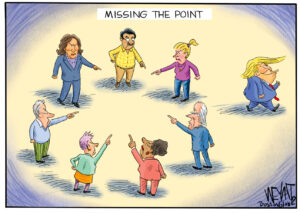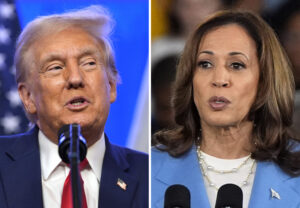Puerto Rico is Nothing and Everything for the Democrats
What the Democratic primary says about Puerto Rican politics and the Biden coalition’s standing with Hispanic voters. Vice President Kamala Harris stands in front of a Puerto Rican flag, in San Juan, Puerto Rico, Friday, March 22, 2024. (AP Photo/Alejandro Granadillo)
Vice President Kamala Harris stands in front of a Puerto Rican flag, in San Juan, Puerto Rico, Friday, March 22, 2024. (AP Photo/Alejandro Granadillo)
On a recent Sunday evening, polls closed in Puerto Rico for the island’s Democratic primary where Joe Biden received a resounding victory. The vote was held without drama, and almost guaranteed that all of Puerto Rico’s 65 Democratic National Committee delegates, a larger delegate share than 24 states in the union, will be awarded to President Biden at the Democratic National Convention in Chicago this summer.
A closer look, however, reveals that the results are not all good news for the incumbent. The Puerto Rico primary had its lowest turnout in history, nearly equaling the turnout for 2020, which was held at the height of the COVID-19 pandemic. The numbers hold lessons for Biden’s relationship with the island and Hispanic voters generally.
Several factors contribute to make Puerto Rican politics unique from the United States. First of all, we are not a state, but a “territory”; or, as a majority of Puerto Ricans including myself would say, a colony of the United States. We are disenfranchised from U.S. politics and cannot vote in Congress or for president. As the recent primary results show, we increasingly don’t actually want to anyway, nor should we. With colonialism and disenfranchisement comes low participation. Additionally, Puerto Rico has its own political parties and systems; instead of two major parties, we have five; all share power to some degree in the three branches of government, and all represent different voter demographics that are specific to Puerto Rico and do not align with the federal parties. We have our own political traditions and institutions in which voter mobilization and turnout has been historically high, with some local elections having more than an 80% turnout.
The Puerto Rico primary had its lowest turnout in history, nearly equaling the turnout for 2020, which was held at the height of the COVID-19 pandemic.
Six weeks before the Democratic primary, for example, a special election was held between Luis Davila Pernas, of the pro-statehood New Progressive Party, and Luis Javier Hernandez of the pro-status-quo Popular Democratic Party, two of Puerto Rico’s five parties. This election, with only one polling place in the whole island, managed a nearly 60% higher voter turnout than the Democratic presidential primary. Unlike federal candidates in Washington, they could mobilize their bases and count on people-to-people support.
In the 1988 Democratic Primary, nearly 275,000 voters on the island turned out to give Rev. Jesse Jackson a resounding victory. In 2008, 385,000 voters turned out for the presidential primaries. In 2016, participation dropped to 86,000; in 2020, there was a significant drop to 7,022 votes. COVID-19 played a factor in this, but can’t explain why in comparison nearly 300,000 voters turned out in the primaries for Puerto Rico’s local parties in the middle of the pandemic. This number dropped further in 2024 to only 3,961 votes — that’s a 0.26% voter turnout. Yes, the primary was noncompetitive, but the stark drop in voters transcends that factor. Progressive activists who used to be aligned with the Democratic Party are now drifting away. In the past, many of these activists supported the idea of decolonization and independence for Puerto Rico, but still participated in the U.S. political process. The decline in turnout reflects an activist community that is increasingly focused on independence, not U.S. federal politics.
Recent polls and recent referendums indicate that a small majority or close to a majority of Puerto Ricans want statehood. But support for statehood is being challenged by a resurgent interest in independence. Recent credible polling puts Juan Dalmau, the gubernatorial candidate of the Puerto Rican Independence Party within the margin of error of winning the 2024 elections. The party is currently in an electoral coalition with another progressive party, the Citizen’s Victory Movement, whose candidate for resident commissioner, Ana Irma Rivera Lassen, who prefers independence, has said she would caucus with the Democrats in Washington if elected, but did not encourage members of her party to vote in the Democratic primary.
Many in Puerto Rico resent the occasional presence of U.S. politicians on the island. When Kamala Harris recently visited a community center in Puerto Rico, she was greeted by pleneros, traditional singers, who sang a protest song to her in Spanish: “We want to know why you came here, we want to know what you will do about the colony.” As I tried to approach the center to cover her arrival, I saw a passerby ask why there was such a big police blockade on the street. Another passerby shouted back, “They say the vice president of some country is on vacation here today.”
Many in Puerto Rico resent the occasional presence of U.S. politicians on the island.
I believe growing support for Puerto Rico’s independence is a contributing factor of declining participation in Democratic primaries. It also signals to the Biden administration a need to adjust their position on Puerto Rico policy from being ambivalently statehood-leaning, to including a serious and binding decolonization process that takes independence seriously and negotiates it on fair and equitable terms. How the administration responds to evolving political opinions on the island will be a factor in his efforts to woo key Puerto Rican votes in swing states like Pennsylvania and Georgia, and in New York, where Democrats are looking to win back House seats such as NY-1, NY-2, NY-4, NY-6 and NY-7 in Long and Staten Islands.
Puerto Ricans have lost their appetite for the pro-statehood and status-quo parties that have dominated local politics for decades. They have most certainly lost their appetite for participation in a federal system that in the last decade has only further disenfranchised them. To help win back key districts and swing states, Democrats and the Biden campaign should recognize the political conditions in Puerto Rico have changed, acknowledge where the U.S. has faulted the people of the island, and support an inclusive and equitable process of decolonization and self-determination.
Your support matters…Independent journalism is under threat and overshadowed by heavily funded mainstream media.
You can help level the playing field. Become a member.
Your tax-deductible contribution keeps us digging beneath the headlines to give you thought-provoking, investigative reporting and analysis that unearths what's really happening- without compromise.
Give today to support our courageous, independent journalists.








You need to be a supporter to comment.
There are currently no responses to this article.
Be the first to respond.